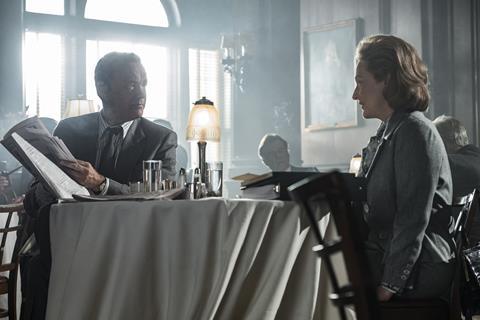Awards-friendly drama about the Washington Post and the publication of the Pentagon Papers starring Meryl Streep and Tom Hanks

Dir: Steven Spielberg. US. 2017. 116mins
A crackling entertainment made with precision and political purpose, The Post examines a crucial moment in American journalism from more than 45 years ago, although the film clearly invites viewers to see the material’s gripping contemporary relevance. Of a piece with his recent, stately dramas Lincoln and Bridge Of Spies, director Steven Spielberg’s latest brings intelligence and electricity to its study of nimble strategic manoeuvring which is guided by urgent performances from Meryl Streep and Tom Hanks.
The story’s timeliness in the face of the Trump administration’s attempts to discredit journalists could provoke significant media attention
And, in examining the challenges of a female newspaper publisher in the crosshairs of a vindictive president, The Post ultimately becomes a rousing feminist crowd-pleaser about the need to speak truth to power.
Opening December 22 in the US and January 19 in the UK, this true-life tale looks to be a serious awards contender, and certainly the major names involved should attract discriminating audiences. Fans of Spotlight and All The President’s Men (of which The Post could almost be considered a prequel) will take note, and the story’s timeliness in the face of the Trump administration’s attempts to discredit journalists could provoke significant media attention.
Set in 1971, The Post stars Streep as Kay Graham, the reluctant new owner of The Washington Post after her husband’s suicide. Uncomfortable in the role, but wanting to preserve the legacy of the long-running paper, the grieving Graham must balance severe financial pressures with Post editor Ben Bradlee’s (Hanks) desire to publish classified documents that outline the government’s years-long private acknowledgment of its failure in the on-going Vietnam War.
The screenplay, credited to Liz Hannah and Spotlight co-writer Josh Singer, may follow a somewhat familiar trajectory, depicting intrepid journalists fighting to uncover an important story. But Spielberg not only invests the material with riveting tension but also deftly illuminates his central figures so that we understand the conflicting temperaments and ambitions of everyone on screen.
The Post features one of Streep’s least-fussy performances, and she expertly portrays a woman of privilege who is forced to make difficult decisions that could scuttle the newspaper and land her in jail. (The Nixon administration, looking to silence The Washington Post and The New York Times, which are both seeking to publish the so-called Pentagon Papers, threatens the journalists with imprisonment if they defy a court injunction against them.) In incremental measures, the three-time Oscar-winner charts Graham’s perilous journey from passive socialite to hard-nosed businesswoman who must square off with a patronising all-male board that doubts her leadership abilities and opposes Bradlee’s insistence that the paper publish these documents for the good of the nation.
In his later years, Spielberg has largely moved away from spectacle to craft sombre, almost old-fashioned dramas that find him trying his hand at unfamiliar genres. The Post is a skilful journalism thriller that intricately maps the reporting and legal wrangling that went into the newspaper’s exposé. But he always keeps an eye on the obvious modern parallels — especially in the form of Bradlee, who Hanks plays with bulldog intensity as a man sworn to report the truth, no matter the consequences.
Hanks and Streep’s blunt, lived-in portrayals present us with portraits of courage that speak to the present struggles in the United States as reporters try to investigate a White House simmering with scandal and flaunting an arrogant disregard for the sanctity of journalism in a democracy.
A large cast, highlighted by Tracy Letts as Graham’s trusted right-hand man and Sarah Paulson as Bradlee’s wise wife, fleshes out The Post’s supporting players, many of whom will serve important functions in the overall narrative. Production designer Rick Carter and cinematographer Janusz Kaminski present the Post offices — also the focus of All The President’s Men, which chronicled Nixon’s later fall in the aftermath of the Watergate break-in — and other locales with crisp period detail, but ensure that the viewer’s attention remains engrossed in the story and not the décor. That stripped-down approach honours the no-nonsense attitude of The Post’s relentless journalists, but it also highlights Spielberg’s underlying political message: it takes sure, steady resistance to topple those trying to hide their corruption.
Production companies: Twentieth Century Fox, DreamWorks Pictures, Reliance Entertainment, TSG Entertainment, Amblin Entertainment, Star Thrower Entertainment, Pascal Pictures
Worldwide distribution: Fox (United States), Amblin Entertainment
Producers: Amy Pascal, Steven Spielberg, Kristie Macosko Krieger
Executive producers: Tim White, Trevor White, Adam Somner, Tom Karnowski, Josh Singer
Screenplay: Liz Hannah and Josh Singer
Cinematography: Janusz Kaminski
Production design: Rick Carter
Editors: Michael Kahn, Sarah Broshar
Music: John Williams
Website: www.thepostmovie.com
Main Cast: Meryl Streep, Tom Hanks, Sarah Paulson, Bob Odenkirk, Tracy Letts, Bradley Whitford, Bruce Greenwood, Matthew Rhys
























